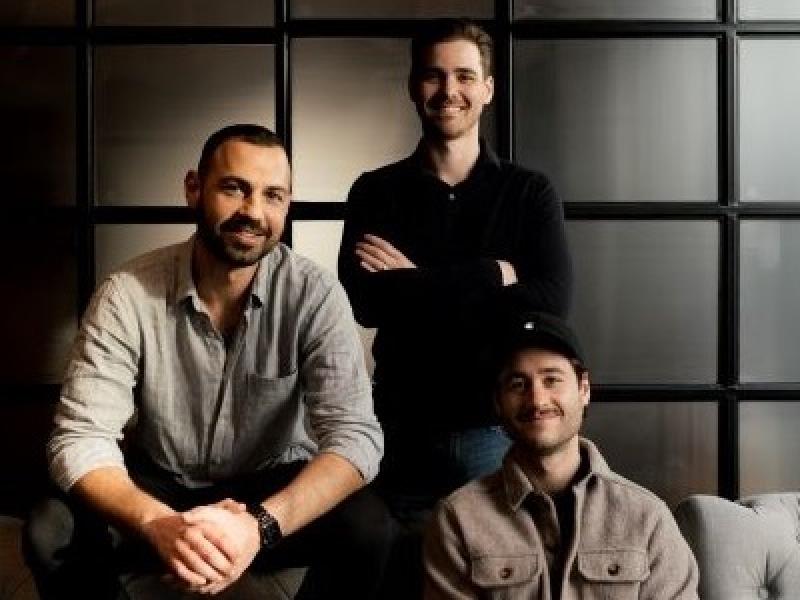
Canadian company Carbon Neutral Club (CNC) aims to drive climate action and awareness in the workplace via software that tracks and incentivizes cutting individual greenhouse gas emissions in a friendly competition.
Co-founded in July 2021 by Jack Bruner, Jeff Packer and Roee Eidan, CNC is Canada-wide with most of its leadership based in Toronto.
Packer, who spoke to SustainableBiz, oversees marketing and digital products at CNC. The former manager of strategy and technology at Konrad Group said the “primitive idea” for the company was conceived by Bruner, then a co-worker at Konrad. The two left Konrad and took on Eidan as their CTO through Bruner’s family connection.
CNC, Packer said, brings “climate action into company culture.” The co-founders identified integrating climate action into the workforce as one of the fastest and most effective ways of building a climate movement.
“There’s nothing more powerful when it comes to climate action than being able to bring a group together around a common cause and giving them the tools to educate themselves and also take action,” Packer said.
Quantifying individual and workplace climate impact
The company’s software-as-a-service model starts with employees calculating their carbon footprints by answering questions related to their activities and choices that contribute carbon emissions and workplace emissions.
Personal emissions cover factors like diet, choice of transportation and housing. Scope 3 emissions related to the workplace activities cover actions such as commuting and meals eaten while on the job.
The company uses the Greenhouse Gas Protocol and its own methodology for the calculations.
A platform to help change behaviour is integrated into workplace tools like Slack to “deliver bite-sized, educational climate content related to the individual in additional to the company as a whole” to inspire decarbonization.
In a leaderboard, workplace teams can see the progress each user has made toward their emissions and how much they emitted. The idea is to promote friendly competition through gamification. CNC presents challenges to reduce one’s footprint, like swapping one red meat meal per week for a vegan meal, or engaging with its educational content, which earns points upon success.
Those points can be redeemed for rewards from over 75 sustainable brand partners ranging from clothing to coffee. There is also a plan to roll out an incentive program for top performers every month to earn rewards or savings from those partners.
Packer said it is typically solicited by small businesses led by an executive team seeking ways to help employees take climate action, or large publicly traded companies with mandatory climate disclosures and net-zero plans.
The software charges the company $6 or $10 per employee per month, depending on the package chosen by the organization.
Packer agrees there is some truth to the notion that individual actions alone cannot right the ship on climate action, but organizations and policy makers are sensitive to consumer sentiment – how we buy and vote – which dictates action, he argues.
Ensuring progress and eco-inclusivity
The purpose is to promote “eco-inclusivity,” regardless of the size of their footprint, to “celebrate individuals for making those small changes.”
CNC is “pseudo-voluntary” in Packer’s words, as people are free to enrol or abstain. Eighty per cent of employees signed up according to the company’s data, which Packer said indicates people are interested in learning more about reducing their climate impact.
To curb cheating the system, CNC allows certain activities to be validated by colleagues. If an individual chose to lower their emissions by eating less red meat at work, it can be verified by their colleagues.
The company is aware of the risk of 'climate-shaming' employees, who may want to misrepresent their progress if they did not meet their goals.
Packer admits there is no use case yet for people who did not meet goals, but said it is crucial avoid shaming. “If we alienate individuals who are starting with a really high carbon footprint, then we are not going to be able to make a significant change.”
Rather than penalize people by removing points, he prefers delivering more education relevant to their needs.
The Patch partnership
For difficult-to-abate emissions, CNC is offering a partnership with San Francisco-based Patch for members to purchase emissions offsets.
Packer said Patch offers breadth by supporting “frontier" climate tech projects such as kelp forest growth and CarbonCure’s carbon-capturing cement – expensive projects that need more funding to be viable.
All the offsets purchased via CNC will go directly to Patch, and there is no plan to monetize it, he added.
CNC’s clients and impact
CNC serves hundreds of companies, according to Packer. It has onboarded startups with 50 to 200 employees, including Toronto-based Manifest Climate as a banner client, along with Victoria-based Redbrick and Patch.
It usually adds 10 to 20 clients per month from organic growth and has signed up thousands of employees, Packer said.
The company says it offset over 14 million kilograms of carbon dioxide through voluntary changes or companies offsetting Scope 3 emissions. Approximately $200,000 was spent on offsetting emissions through Patch.
CNC raised $1.4 million in a round led by Emend Vision Fund, Blue Vision Capital, and Good News Ventures that closed in October 2022.
With the funds, CNC hired a head of growth to build out its marketing team (the company did not spend a cent on marketing before the fundraise, Packer said), and bolstered its technical capabilities.
Its goals are to better quantify greenhouse gas emissions data, build out its features in workday apps such as Slack and Teams, and triple its head count.
It is also planning to include curated petitions, where employees can add their names to requests for the organization to alter its path.
CNC currently serves Canada and the U.S., but hopes to expand into Europe by the end of the year according to Packer. Several Scandinavian companies and schools have already expressed interest, he said.










